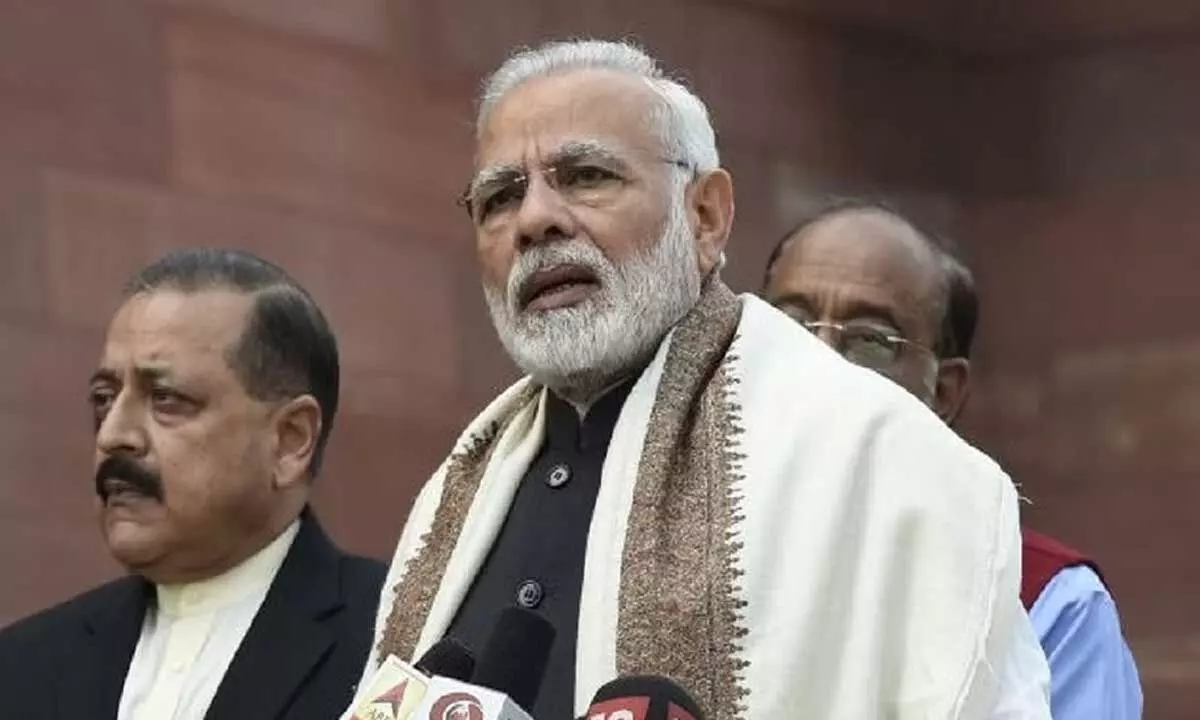Live
- A feminist lens on our mythology
- Prakasam police rescues kidnapped toddler within hours
- Time to get rid of Sattavad and Parivarvad politics
- Extend neither spl nor ill treatment
- Must-Watch OTT Originals in 2024: The Year’s Best Shows and Movies
- 40 Indian startups secure over $787 mn in a week
- India now formidable force on chess board
- Raghavendra Mutt pontiff visits Tirumala
- Whistleblower of OpenAI found dead in US apartment
- Trump’s US-first policy & India’s strategic latitude
Just In
BJP hopeful of one-nation-one-election ballast to its poll prospects

For the BJP, Prime Minister Narendra Modi's big move to push through his 'one-nation-one-election' concept promises to be the big ticket idea which can disrupt conventional calculations and allow it to frame the upcoming Lok Sabha polls
New Delhi: For the BJP, Prime Minister Narendra Modi's big move to push through his 'one-nation-one-election' concept promises to be the big ticket idea which can disrupt conventional calculations and allow it to frame the upcoming Lok Sabha polls along helpful lines as the party believes the issue has the potential to catch popular imagination.
The government's decision on Friday to form a committee under former president Ram Nath Kovind to explore the feasibility of simultaneous elections promises to turn the matter, which has long animated the prime minister, into a weighty political plank in the run-up to five state assembly polls followed by the all-important Lok Sabha elections. Coming as it does a day after the government announced a "special session" of Parliament between September 18-22, the development has fuelled buzz about the possibility of early Lok Sabha polls, even though no official agenda for the legislature's meeting has been put out so far.
Despite uncertainty about how the issue will pan out and if the government will take it up during the session, most BJP leaders sounded confident about its implications for the party. With the party's performance in state polls often inferior to its show in Lok Sabha elections, its leaders are of the view that simultaneous Lok Sabha and state assembly polls will result in overarching national issues and 'Modi factor' to play a bigger role, stripping regional agenda and leadership of some of their sway. Generally, it is the regional parties, and not the main opposition Congress, which have proved more resilient and successful in fighting the BJP. Political experts believe that they may be at a disadvantage if assembly polls are held together with Lok Sabha elections as national issues are bound to make a deeper impact.
Though Odisha voters made a point in 2019 when their support for the BJP in the assembly polls was six per cent less than in the Lok Sabha election despite both being held simultaneously. Even before Modi, the BJP had vigorously pushed for simultaneous elections under Vajpayee-Advani's leadership. When Atal Bihari Vajpayee was prime minister, Advani as his deputy had made a pitch for it but the issue fizzled out as other parties remained cool to the proposal and the BJP was then far from the dominant force it became under Modi. The party had made a promise on similar lines in its manifesto for the 2014 Lok Sabha polls. "The BJP will seek, through consultation with other parties, to evolve a method of holding Assembly and Lok Sabha elections simultaneously.
Apart from reducing election expenses for both political parties and Government, this will ensure certain stability for State Governments," it had said. After leading the BJP to its maiden majority in Lok Sabha, Modi made his first public pitch for simultaneous elections at a Diwali interaction in 2016, setting in motion a process which elicited mixed views and appeared to have lost some momentum before the fresh push by the government on Friday brought it nearer to fruition than ever before. Modi's strong advocacy for holding Lok Sabha, state and local body polls together had come after he broached the topic informally at an all-party meeting in March same year. He then sought a wider debate noting that many politicians even from the opposition personally supported the idea but were wary of doing so publicly for political reasons. At party forums and in public, the prime minister has built his arguments against an almost unceasing election cycle in the country on two pillars of avoidable massive public expenditure and blow to development works.
The Model Code of Conduct during polls bar the announcement of any fresh development initiatives and the deployment of senior officials for conducting polls in different parts of the country also deal a blow to the implementation of ongoing work, he has argued. He has also held that political debate and public discourse often take on coarser dimensions due to frequent polls as politicians driven by electoral expediency say and do thing which they may not if there is no poll round the corner. After returning to power in 2019, Modi had called for an all-party meeting on the issue but some major opposition parties, including the Congress and the Trinamool Congress, abstained after criticising the idea as anti-democratic and against federalism. Most INDIA bloc parties are opposed to the idea of simultaneous elections, which will require laws amending the Constitution and thus need the support of two-third members in both the Houses of Parliament. While the BJP can muster the required number in Lok Sabha, it lacks even a simple majority in Rajya Sabha and will need support from unexpected quarters to put together the numbers needed

© 2024 Hyderabad Media House Limited/The Hans India. All rights reserved. Powered by hocalwire.com






